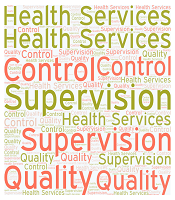Dear Editor,
The health system includes all organizations and resources that provide health measures which can promote the individuals’ levels and quality of life in the community by restoring, maintaining, and improving individuals’, families’, and communities’ health. Thus, health system management is of great importance (1). Health system managers are responsible for increasing productivity and reducing the costs of the system. On the other hand, the services provided must be safe and of high quality (2).
Success in management requires the knowledge and art of performing all the tasks accurately and entirely based on the importance and scope of the work. One of the main tasks of management is supervision. Considering the nature of health services, it seems crucial to supervise the centers that provide health services, and inaccurate supervision of them may lead to unfortunate events. On the other hand, a large number of health centers, the difference in the quality of services provided, and the need for transparency make strong supervision inevitable (3).
In the Iranian health system, supervision is not performed properly due to the parallel work and rework done by various organizations and departments. Since no organization is the main accountable, there is insufficient task performance and poor supervision (4).
By using management measures, solutions can be made to improve supervision and thus increase the quality of healthcare services, including reorganizational structure, reducing organizational hierarchy, separation of supervision, assessment, and accreditation from the body of the Ministry of Health (formation of independent organizations for monitoring and inspection), presentation of performance report for providers, and performance-based payment (1, 5).
It seems one of the best options for supervising and evaluating various departments in the health system is insurance because it is a buyer of the services provided by health centers. As buyers of health services, insurance organizations should oblige themselves to supervise and evaluate health centers carefully to increase the quality of services and reduce costs.
